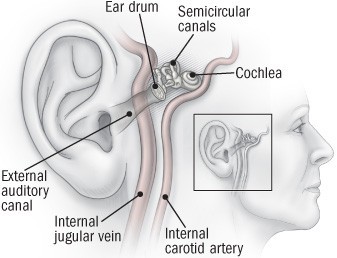Have you ever been lying in bed or sitting in a quiet room and suddenly become aware of a rhythmic pulsing sound in your ear? It might sound like a thumping, whooshing, or throbbing in sync with your heartbeat. This phenomenon, known as pulsatile tinnitus, can be unsettling, especially if you’re unsure of its cause or significance. While it can be alarming to suddenly notice this internal rhythm, understanding what pulsatile tinnitus is and its potential causes can help alleviate anxiety and guide you on when to seek medical advice.
Pulsatile tinnitus is characterized by the perception of a rhythmic sound in one or both ears that coincides with your heartbeat. Unlike the more common subjective tinnitus, which is often described as ringing, buzzing, or hissing and is not linked to a specific sound source, pulsatile tinnitus is often caused by changes in blood flow in the vessels near the ear. The sound you hear is essentially the sound of your own blood flow becoming audible. This increased awareness can be due to various factors affecting the way sound is conducted in your ear or changes in your circulatory system.
Several conditions can lead to the experience of hearing your heartbeat in your ear. Understanding these potential causes is the first step in determining the best course of action.
Common Causes of Pulsatile Tinnitus
- Conductive Hearing Loss: This type of hearing loss occurs when sound waves are not effectively transmitted through the outer and middle ear to the inner ear. Conditions such as middle ear infections, fluid accumulation, or problems with the small bones in the middle ear (ossicles) can cause conductive hearing loss. When this happens, internal body sounds, including the flow of blood through major vessels like the carotid artery and jugular vein located near the ear, can become amplified and more noticeable.
-
Carotid Artery Disease: The carotid arteries, major blood vessels in your neck that supply blood to your brain, can develop atherosclerosis, a condition where plaque builds up inside the artery walls. This plaque can cause turbulent blood flow, creating the pulsing sound of tinnitus that is synchronized with your heartbeat.
-
High Blood Pressure (Hypertension): Elevated blood pressure increases the force of blood flow through your arteries. This stronger blood flow, particularly in the carotid artery, can become turbulent and audible as pulsatile tinnitus. Managing high blood pressure is crucial for overall health and can sometimes alleviate this symptom.
-
Blood Vessel Disorders: Various abnormalities in blood vessels can also lead to pulsatile tinnitus. These include:
- Aneurysms: A weakened and bulging section in a blood vessel wall can disrupt normal blood flow.
- Arteriovenous Malformations (AVMs): These are abnormal connections between arteries and veins, which can alter blood flow dynamics.
- Twisted Arteries: Kinking or twisting of arteries can create turbulence.
- Glomus Tumors: These are benign tumors that can develop in blood vessels behind the eardrum and can sometimes cause pulsatile tinnitus.
When Should You Be Concerned?
While pulsatile tinnitus can be benign and sometimes resolve on its own, it’s important to know when to seek medical advice. If you experience pulsatile tinnitus that:
- Persists for more than a few weeks.
- Becomes increasingly bothersome or disruptive to your daily life.
- Is accompanied by other symptoms such as dizziness, hearing loss, headache, or vision changes.
It is advisable to consult with your doctor.
What to Expect During a Medical Evaluation
If you decide to see a doctor about pulsatile tinnitus, they will typically start by taking a detailed medical history, asking about your symptoms, medical background, and any medications you are taking. A physical examination will follow, including a thorough examination of your ears. Your doctor will likely use a stethoscope to listen to the blood flow in your neck arteries, specifically the carotid arteries, to check for unusual sounds called “bruits,” which can indicate turbulent blood flow or blockages.
Depending on the initial assessment, your doctor may recommend further tests, such as a hearing test (audiogram) to evaluate for any hearing loss. If a bruit or other concerning signs are detected, imaging tests like ultrasound, CT scans, or MRI may be ordered to visualize the carotid arteries and other blood vessels in the head and neck to identify any narrowing, malformations, or tumors.
Conclusion
Hearing your heartbeat in your ear, or pulsatile tinnitus, can be a curious and sometimes worrying symptom. In many cases, it is not indicative of a serious underlying condition and may resolve spontaneously. However, it’s essential to be aware of the potential causes, ranging from minor issues like conductive hearing loss to more significant conditions involving blood vessels. If pulsatile tinnitus is persistent or bothersome, seeking medical evaluation is a prudent step to identify the cause and receive appropriate guidance and, if necessary, treatment. Understanding the reasons behind why you hear your heartbeat in your ear empowers you to take informed steps regarding your health and well-being.
